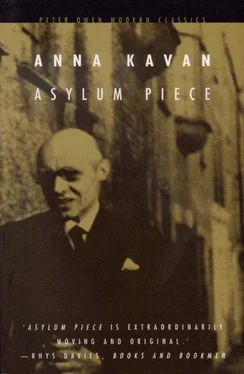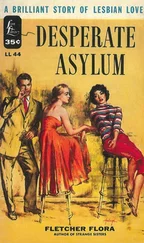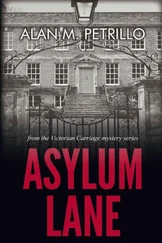But it was not till I got back to the other room and found my visitor gone that I realized that the whole episode had been a cruel hoax, just a reminder of what is in store for me.
There is some quite trivial, distant noise; a sound, moreover, which has nothing to do with me, to which there is not the slightest need for me to pay any attention: yet it suffices to wake me, and in no gentle way, either, but savagely, violently, shockingly, like an air raid alarm. The clock is just striking seven. I have been asleep perhaps one hour, perhaps two. Roused in this brutal fashion, I jump up just in time to catch a glimpse of the vanishing hem of sleep as, like a dark scarf maliciously snatched away, it glides over the foot of the bed and disappears in a flash under the closed door. Useless, quite futile, to dash after it in pursuit: I am awake now for good, or rather, for bad; the wheels, my masters, are already vibrating with incipient motion; the whole mechanism is preparing to begin the monotonous, hateful functioning of which I am the dispirited slave.
‘Stop! Wait a little — it’s so early — Give me a little respite!’ I cry, although I know it is quite in vain: ‘Only let me have a little more sleep — an hour — half an hour — that’s all I ask.’
What’s the good of appealing to senseless machinery? The cogs are moving, the engines are slowly gathering momentum, a low humming noise is perceptible even now. How well I recognize every sound, every tremor of the laborious start. The loathsome familiarity of the routine is almost the worst part of it, intolerable and inescapable at the same time, like a sickness inside the blood. This morning it drives me to rebellion, to madness; I want to batter my head on the walls, to shatter my head with bullets, to beat the machines into pulp, into powder, along with my skull.
‘It’s horribly unjust!’ I hear myself calling out — to what, to whom, heaven alone knows. ‘One can’t work so many hours on so little sleep. Doesn’t anyone know or care that I’m dying here amongst all these levers and wheels? Can’t somebody save me? I haven’t really done anything wrong — I feel terribly ill — I can hardly open my eyes —’
And it’s true that my head aches abominably and I feel on the point of collapse.
Suddenly I notice that the light which hurts my eyes so much comes from the sun. Yes, the sun is actually shining outside, instead of snow there is dew sparkling all over the grass, crocuses have spread their neat, low fire of symmetrical flames under the rose bushes. Winter has gone; it is spring. In astonishment I hurry to the window and look out. What has happened, then? I feel dazed, bewildered. Is it possible that I am still living in a world where the sun shines and flowers appear in the springtime? I thought I had been exiled from all that long ago. I rub my tired eyes; still there is sunlight, the rooks flap noisily about their nests in the old elms, and now I hear how sweetly the small birds are singing. But even as I stand there all these happy things start to recede, to become phantasmal, transparent as the texture of dream plasma, banished by the monstrous mechanical outlines of pulleys, wheels, shafts, which in their orderly, remorseless and too-well-known evolutions now with increasing insistence demand my attention.
Like a fading mirage in the background I can still, straining my eyes, faintly discern the sunlit grass, the blue, blue arches of sky across which a green shape flies in remote parabola, the ghost of an emerald dagger spectrally flung.
‘Oh, stop — stop! Give me another minute — just a minute longer to see the green woodpecker!’ I implore, with my hands already, in automatic obedience, starting to perform their detested task.
What does a machine care about green woodpeckers? The wheels revolve faster, the pistons slide smoothly in their cylinders, the noise of machinery fills the whole world. Long since cowed into slavish submission, I still draw from some inexorable source the strength to continue my hard labour although I am scarcely able to stand on my feet.
In a polished surface of metal I happen to notice my reflected face; it wears a pale, beaten lonely look, eyes looking out at nothing with an expression of fear, frightened and lonely in a nightmare world. Something, I don’t know what, makes me think of my childhood; I remember myself as a schoolchild sitting at a hard wooden desk, and then as a little girl with thick, fair, wind-tossed hair, feeding the swans in a park. And it seems both strange and sad to me that all those childish years were spent in preparation for this — that, forgotten by everybody, with a beaten face, I should serve machinery in a place far away from the sun.
The scene is set exactly like a stage upon which a light comedy, something airy and gay, is about to be acted. At the back can be seen part of the ground floor of a mansion with doors right and left opening upon a wide terrace where tables and chairs are arranged. In front, a flight of shallow stone steps leads down to the garden. Large pillars of light-coloured stone support the roof of the terrace. At each end, beyond the final column, the walls of the house can be seen covered by creepers which are a mass of brilliant orange and purple flowers. Some of the full-blown flower trumpets have been carried by the wind on to the steps where they lie as if strewn for the feet of a bridal procession. The foreground, which in a theatre would be the auditorium, consists of an enormous view over falling ground with a lake in the middle distance and mountains beyond. The whole vista is flooded with dazzling midsummer sunshine.
At first there is no one to be seen. A flock of pigeons circles round twice with flashing wings and vanishes into the upper blue.
The door at the right extremity of the terrace opens and a number of people emerge. They are well-dressed men and women of varying ages who stand about or sit in groups round the tables. They have just finished lunch. Some are smoking, some have coffee cups in their hands. The most striking thing about them is their silence. Only a few talk together; the others seem abstracted, or as if suspended, as if waiting to be told what to do. After a few moments they start to drift slowly across the terrace and vanish one after another through the door on the left. A grey-haired woman who appears to be in a position of authority is seen to be shepherding them along. She settles a group of four at a table on the extreme left and gives them a pack of cards which one of them deals in a perfunctory fashion.
A stout man in a dark suit occupies the most comfortable chair in the middle of the terrace. He is about forty years old, slightly bald, and has a round, red, cheerful face. He unfolds a newspaper and starts to read. Something, it is not easy to say what, distinguishes him from the people who have lately passed by. Perhaps it is merely that he is exempt from the domination of the grey-haired woman. He is the Professor.
After a minute or two, the door on the left opens and three new figures emerge with a somewhat stealthy appearance: they have an obvious air of having evaded authority. At the sight of the Professor, whom they had not expected to find there, they hesitate uncertainly, but he smiles at them over his paper and waves them forward with an indulgent gesture. Relieved, they advance past the card players, who glance up at them with faint curiosity, and then seat themselves on the top step of the terrace just in front of the Professor.
Here they remain for a while without speaking, staring through their dark glasses into the glare. The central person of the trio is a young woman with yellow hair. She is smartly dressed in pale pink. On her right is a young man with the pointed ears and the half wistful, half malicious look of a faun. The man on her other side is older with a sad Jewish face. Between all three a curious resemblance is noticeable, and this is not only due to the fact that each one is slender and elegant and wearing a pair of dark spectacles.
Читать дальше












